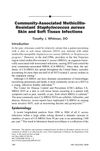 6 citations,
May 2021 in “Clinical Chemistry and Laboratory Medicine”
6 citations,
May 2021 in “Clinical Chemistry and Laboratory Medicine” Different ACE2 gene versions may affect COVID-19 impact based on age and suggest some hair loss drugs could be potential treatments.
 2 citations,
January 2019 in “Indian Dermatology Online Journal”
2 citations,
January 2019 in “Indian Dermatology Online Journal” The congress concluded that misuse of antifungal drugs in South Asia has led to widespread treatment failure, and new approaches and regional cooperation are needed.
 January 2025 in “Journal of Clinical Medicine”
January 2025 in “Journal of Clinical Medicine” Unsanitary barber practices can spread scalp infections, treatable with oral antifungals.
[object Object]  December 2024 in “Archives of Dermatological Research”
December 2024 in “Archives of Dermatological Research” COVID-19 vaccines do not increase the risk of alopecia areata.
 January 2024 in “Journal of Biosciences and Medicines”
January 2024 in “Journal of Biosciences and Medicines” Future treatments for androgenic alopecia may focus on reactivating hair follicle stem cells and improving drug delivery.
June 2023 in “F1000Research” A young woman with lupus developed tuberculosis due to weakened immunity from her medication, showing the need for better TB screening in such patients.
 May 2023 in “Journal of Clinical Medicine”
May 2023 in “Journal of Clinical Medicine” New understanding and treatments for hair loss are improving, but more research is needed.
 May 2023 in “International Journal of Trichology”
May 2023 in “International Journal of Trichology” Tofacitinib effectively treated severe hair loss in a patient who didn't respond to other treatments.
 March 2022 in “Wound practice & research”
March 2022 in “Wound practice & research” New treatments for alopecia areata show promise, but standardized guidelines are needed.
33 citations,
January 2001 in “Critical care clinics” Dietary lipids affect inflammation and are crucial for normal cell function and immune health.
 4 citations,
July 2019 in “Clinics in Dermatology”
4 citations,
July 2019 in “Clinics in Dermatology” The document concludes that while white skin, nail, and mucosa diseases increase skin cancer risk, they are generally harmless, especially compared to darker pigmentation conditions.
[object Object] 241 citations,
August 2005 in “Journal of Investigative Dermatology Symposium Proceedings” Dandruff and seborrheic dermatitis are caused by yeast feeding on scalp oils, leading to irritation and flaking.
23 citations,
December 2013 in “Journal of Investigative Dermatology Symposium Proceedings” Genetic discoveries are leading to new treatments for alopecia areata.
 65 citations,
October 2018 in “Frontiers in cellular and infection microbiology”
65 citations,
October 2018 in “Frontiers in cellular and infection microbiology” Certain bacteria and fungi are linked to healthy scalps and dandruff, suggesting that the scalp's microbial balance affects its health.
 47 citations,
March 2022 in “Frontiers in cellular and infection microbiology”
47 citations,
March 2022 in “Frontiers in cellular and infection microbiology” Changes in skin microbes play a role in some skin diseases and could lead to new treatments.
6 citations,
December 2022 in “Journal of Infection” The ACE1 gene variant doesn't affect long-COVID symptoms.
 23 citations,
September 2021 in “Frontiers in Cellular and Infection Microbiology”
23 citations,
September 2021 in “Frontiers in Cellular and Infection Microbiology” Testosterone's effects on COVID-19 are unclear and need more research.
 86 citations,
September 1977 in “BMJ”
86 citations,
September 1977 in “BMJ” Minoxidil effectively controls blood pressure in severe cases, but has serious side effects and causes hair growth in women.
 9 citations,
May 2005 in “Expert Review of Clinical Immunology”
9 citations,
May 2005 in “Expert Review of Clinical Immunology” Blocking interferon-gamma might help treat various autoimmune diseases.
 April 1978 in “Pediatric research”
April 1978 in “Pediatric research” Patients with anorexia nervosa did not show a correlation between zinc levels and taste perception or the severity of their condition.
 191 citations,
May 2018 in “British journal of dermatology/British journal of dermatology, Supplement”
191 citations,
May 2018 in “British journal of dermatology/British journal of dermatology, Supplement” Alopecia areata is likely an autoimmune disease with unclear triggers, involving various immune cells and molecules, and currently has no cure.
 34 citations,
June 2014 in “The BMJ”
34 citations,
June 2014 in “The BMJ” Pregnancy can change skin disease severity, with some conditions improving and others worsening, and treatment should balance benefits and fetal safety.
 18 citations,
November 2008 in “Disease-a-Month”
18 citations,
November 2008 in “Disease-a-Month” A common cause of skin infections in the U.S. is a strain of bacteria resistant to certain antibiotics, and prevention focuses on cleanliness and avoiding close contact.
 18 citations,
November 2007 in “Annals of Surgery”
18 citations,
November 2007 in “Annals of Surgery” Finasteride reduces inflammation and improves immune response after trauma by altering hormone levels.
 15 citations,
April 2003 in “Journal of dermatology”
15 citations,
April 2003 in “Journal of dermatology” Alopecia areata causes hair loss due to an immune attack on hair follicles, influenced by genetics and environment.
 7 citations,
May 2012 in “British Journal of Dermatology”
7 citations,
May 2012 in “British Journal of Dermatology” Chemical exposure may contribute to the rise in atopic diseases and needs more research.
 June 2024 in “Research Square (Research Square)”
June 2024 in “Research Square (Research Square)” Copper deficiency is linked to post-COVID-19 hair loss in women.
 April 2024 in “BMB Reports”
April 2024 in “BMB Reports” Lack of Cisd2 disrupts calcium balance in cells, leading to poorly functioning neutrophils.
 November 2019 in “Harper's Textbook of Pediatric Dermatology”
November 2019 in “Harper's Textbook of Pediatric Dermatology” The document is a detailed medical reference on skin and genetic disorders.
 121 citations,
November 2020 in “Endocrine”
121 citations,
November 2020 in “Endocrine” Male hormones like testosterone may make COVID-19 worse, and testing for sensitivity to these hormones could help predict how severe a patient's symptoms might be. Treatments that reduce these hormones are being explored.

























